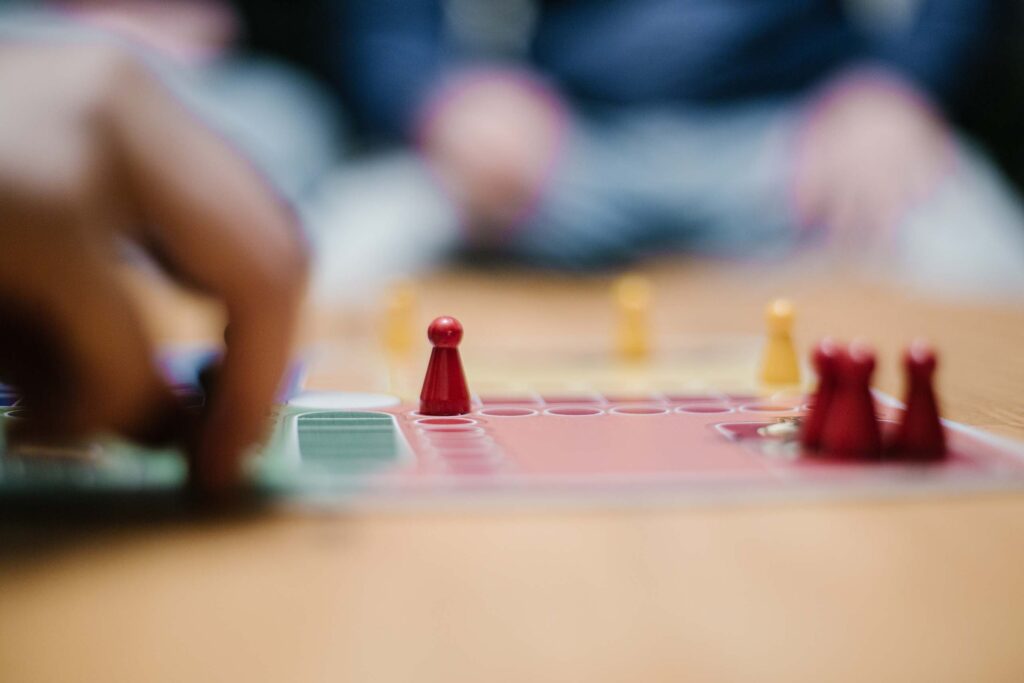Board games are a perfect way to teach your kids about spending, saving, and budgeting. They allow children to test ideas, accumulate wealth, and invest (or go bankrupt!) without risking their real-life savings.
As well as spending valuable family time together, games can teach concepts and strategies in a digestible form (the same way you might hide veggies inside a tasty-looking casserole!).
When it’s time for your next family night, consider grabbing one of these educational and entertaining board games.
1) Monopoly
- Age range: 5 and up
- Duration: 20-180 minutes
- Players: At least 2
Monopoly is perhaps the most popular board game that comes to mind when we talk about financial literacy. It’s exciting to play for both children and adults – you can find many different themed versions of Monopoly, from fantasy genres such as Star Wars and Disney to real-world settings, like significant cities or your hometown!
How it works: The game is all based on investing your money and accumulating the most powerful assets. Players work their way around the board, buying property and paying ‘rent’ when they land on another player’s properties.
Money skills: Investing, saving, trading
2) Cash Flow
- Age range: 5 and up
- Duration: 20-180 minutes
- Players: At least 2 (best suited for two to six players ages 14 and older)
Cash Flow is a game based on the book “Rich Dad, Poor Dad” by Robert Kiyosaki. During the game, players will have to figure out how to distribute money and use different financial strategies.
How it works: Cash Flow helps kids learn how to make money on investments, including opening up opportunities for different types of transactions. Each player needs to plan their budget correctly – a skill that is one of the main ingredients for success.
Money skills: Budgeting, investing, saving
- LibertEx
- Age range: 12 and up
- Duration: 40-60 minutes
- Players: 2-6
LibertEx is about balancing happiness with success. Players navigate through ups and downs, casual opportunities, family obligations, leisure activities, food, and work – just like we grownups have to do every day!
The game is designed to find a balance between money and time. If you don’t learn to rest correctly and on time, the game will be short-lived.
How it works: The game’s goal is to teach players to work hard and think about what’s required to be happy, fulfill dreams, earn money, have a family, develop and relax. All these goals in the game are translated into a monetary reward (for example, buying a yacht in the game would also reward the player with a cash bonus). But not all opportunities and offers are created equal: you have to decide which ones will lead you to ruin or reward!
Money skills: Allocating budget, saving, investing
- Start Up
- Age range: 9 and up
- Duration: 60 minutes
- Players: 2-4
In Start Up, you truly start from scratch. The task is to bring your start-up company to profitable turnover. On the way, real-life obstacles await. For example, each player may experience a lack of time or resources, unexpected problems, the threat of competition, and some unfortunate tricks. The game itself is fun and very dynamic.
How it works: Start Up is all about communication skills and decision-making. It teaches players about real business strategies and how to transform an idea into earnings. From a “start-up” company to a Fortune-500, the game shows off many of the steps required to start a successful business.
Money skills: Budgeting, saving, investing
- Payday
- Age range: 8 and up
- Duration: 40-60 minutes
- Players: 2-4
Payday is all about distributing a family budget (which makes it the perfect family game!). Kids will learn how to handle money and understand why parents can’t always buy everything on the wishlist. Creating and sticking to a budget is vital, so kids can practice what it’s like to save over time.
How it works: One player assumes the role of the banker and records all financial transactions, hands out money, and collects taxes. Players buy and sell various goods, receive bills, and pay fines. From time to time, players are given a salary. The winner is the one who does the best job at allocating a budget and saving.
Money skills: Saving, budgeting
Board games are the perfect way to spend time together and learn valuable smart spending techniques. Whether the goal of a game is to accumulate real estate or a steep savings account, the overall purpose is to have fun while expanding your children’s mindset about managing money.



